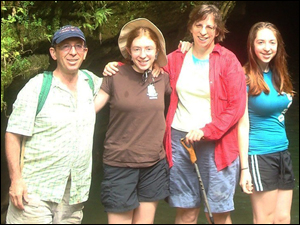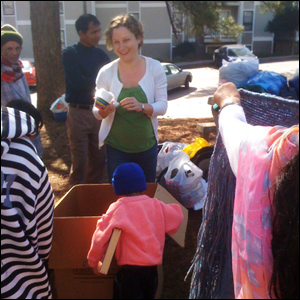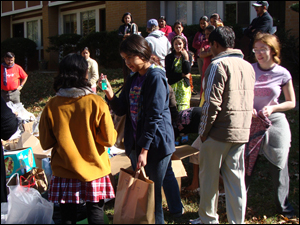CDC Volunteers Aid Bhutanese Refugees
Published: April 9, 2009

A family affair: CDC volunteers Jeff and Leslie Sokolow enjoy family activities with daughters Miriam and Esther. Together, the four have made numerous Sunday deliveries to Bhutanese refugees.
An initial request to aid student immigrants has evolved into a major volunteer initiative, as Centers for Disease Control and Prevention (CDC) staff members help Bhutanese refugees make a new life in the United States.
Last fall when an English for Speakers of Other Languages (ESOL) teacher at Atlanta's Druid Hills High School sent home a message that clothes and supplies were urgently needed for newly arrived Bhutanese students, Leslie Sokolow, MSc, Epidemiology and Prevention Branch, Influenza Division (NCIRD), responded to the call. The mother of two daughters at Druid Hills, Sokolow placed a notice on the Parents-Network Listserv, and was heartened by the generous outpouring of support. "People at CDC 'get it,' she said. "They know that 'there, but for the grace of God, go I.'"
A Growing Volunteer Effort
Sokolow has since become a key coordinator of a growing volunteer effort that provides critical assistance to Bhutanese refugees, many of whom arrive in this country with virtually nothing except a small bag and the clothes on their back. The volunteers have collected and distributed clothing, linens, computers, household items, and school supplies, using CDC distribution networks and community contacts.
As the word spread through CDC, more volunteers have become involved. Now, several CDC buildings have at least one volunteer representative and a collection/drop off site.
Generally, donated items are delivered to the refugees on Sundays. For Sokolow, these weekly outings have become a family affair. Her husband Jeff Sokolow, a writer-editor for MMWR, Division of Creative Services (NCHM), frequently helps with the distribution, and daughters Esther and Miriam also volunteer.
"It's a great family activity," said Sokolow, who pointed out that the deliveries have created friendships and better understanding among the volunteers and the refugees. "You don't have to go across the world to visit a Third World country – just go three miles. My daughters were overwhelmed by the poverty. They now understand that people can be impoverished but are just like them, with dreams, hopes and ambitions."
A Bit of History
Atlanta is one of the main destination points for Bhutanese Nepali refugees recently admitted to the United States after the government offered to resettle 60,000 of the 107,000 of those living in seven United Nations refugee camps in southeastern Nepal. In 1991, they were evicted from their homeland in Bhutan for being members of an ethnic and religious minority group, and have spent the last 17 years in UN refugee camps in neighboring Nepal, where they were not assimilated and could not legally seek work. They have been referred to as the "forgotten people." Since March of last year, approximately 1,600 Bhutanese refugees have immigrated to Atlanta, and thousands more are expected over the next few years.
"Families are arriving every week with only what they can carry," said Sokolow. "They are not prepared for the material requirements of setting up a home, enrolling in school, and looking for employment."

CDC volunteer Ashley Fowlkes, who works in the Epidemiology and Prevention Branch (NCIRD), helped distribute clothing, toys, and household items during a Sunday delivery.
Struggling to Create a New Life
The Bhutanese primarily live in Clarkston, Decatur, and Stone Mountain in low-rent apartments designated by refugee relief agencies. Usually, agencies provide each family with three months' rent and utilities, $100 in cash, a ride to the Social Security office to apply for a card, and a tour of Atlanta to familiarize them with MARTA and the basics of getting around.
However, the quality of agency support varies, and there have been disturbing stories about refugees being "dumped" in dangerous, rat-infested apartments. Although most apartments contain minimum furniture, such as a bed, table, and chairs, there have been instances where there is no furniture at all.
Sometimes refugees are picked up from the airport, and directly dropped off at an apartment, with no orientation. Due to the shortage of caseworkers and agency snafus, many refugees have become victims of bureaucratic overload or the lack of administrative oversight.
"They are frightened," said Sokolow, about the refugees. "They don't speak the language and culturally are deferential. They tend to not look at you directly in the eyes and they need to be more assertive in terms of getting a job and learning to navigate our system."
Enormous Public Health Concerns
Sokolow pointed to enormous public health implications surrounding the plight of the refugees, including environmental concerns. "I've been in apartments where the mildew is so bad, you can cut it with a knife. I know some volunteers who say they can't go inside; they would have an asthma attack. What about the children who live there?"
The stress of resettling in an unfamiliar area, often without adequate support, has also placed a heavy burden on the refugees, several of whom have had heart attacks and other serious health issues. Not knowing where to go for assistance, dealing with a language barrier, and trying to adjust to the ways of a new culture, would be difficult enough for any immigrant. But these issues are compounded by the fact that the Nepali-speaking Bhutanese previously lived for years in a UN refugee camp, where their basic needs were largely taken care of. Now, they must make decisions on their own as they seek to find their way in a new country.
Jean Clare Smith, MD, MPH, a medical officer with the Immunization Services Division (NCIRD), has assisted the refugees for several months and said the issue of safety is another major problem. She and other volunteers described a situation where two families were placed in apartments that sat at the dead-end of a huge complex where many units were boarded up and vagrancy was rampant. Family members had to walk nearly a mile down a winding, snake-like road to enter and exit the complex. One family had teenage girls who were afraid to walk down the road to get to their school bus. The girls felt unsafe; and their mother, too, had to traverse this road alone to attend ESOL class. When volunteers complained to the sponsoring relief agency about the conditions, the agency's solution was to place more families in the complex, in an effort to create a village community.
CDC Volunteers Are Making a Difference

CDC "daughters" learn the importance of giving. Srijana Smith (center), daughter of Jean Clare Smith, delivers toiletries. At right is Miriam Sokolow, daughter of Leslie and Jeff Sokolow.
In addition to the volunteers who help with the Sunday deliveries and the regular drop-off sites in CDC buildings, members of the Coordination Office for Global Health (COGH) Diversity Team coordinated a special clothing drive last fall in conjunction with the Watsonian Society which collected two truckloads of clothes. Pam Moon, the management officer in the Global Program Services Office, told a neighbor about the campaign, and he subsequently arranged for his hotel, to contribute 36 blankets – an especially timely donation at the onset of winter.
Indeed, volunteers recognize the importance of talking to friends, colleagues, and church members about the needs of the Bhutanese refugees. They are working hard to widen their circle of supporters, so that, as Jeff Sokolow put it, "this grassroots effort can lead to an expanded network of donors. From an economic standpoint, the refugees could not be arriving at a worse moment. Their needs far outstrip our little group's ability to provide."
According to Leslie Sokolow, more than 20 CDC volunteers have played an important role in this effort. "[Jean Clare] Smith, Ashley Fowlkes, Carolyn Fisher, Suzanne Hurley, Lisa Briseno, Bob Gerzoff, Srijana Sharma, Heidi Blanck, and Ginny (Virginia) Baresch have given the most time and energy to this important project and without them it would have fizzled by now."

